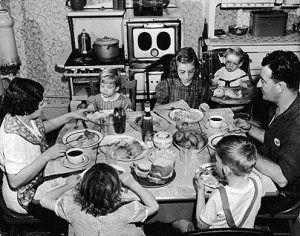Spiritual Formation - Sitting Around The Table
What were your experiences around the kitchen table as a child? Is your experience different than the experience your own children have?
 I posed these questions Friday morning on Twitter and Facebook. These are the same questions my class addressed as we began day four of our spiritual formation class last week. Upon reflection, the kitchen table in my home growing up was a multipurpose table.
I posed these questions Friday morning on Twitter and Facebook. These are the same questions my class addressed as we began day four of our spiritual formation class last week. Upon reflection, the kitchen table in my home growing up was a multipurpose table.
Homework, dinner, family meetings, and even a few "counseling sessions" with mom were regular occurrences for my siblings and I around the kitchen table.
For families, the kitchen table provides an opportunity not only for physical nourishment but also for spiritual nourishment. Twenty-first century families are faced with over-scheduled kids and over-worked parents. And in our busyness, families are outsourcing homemaking to paid service providers who will manage our households and help us raise our children.
Are we outsourcing our homes to service professionals?
Maggie Jackson describes this as homes being mutated into hotels. Service professionals offer us a chance to sit back and relax while they take care of the day-to-day operations of the home. BUT these day-to-day functions can serve to bind, and help parents bond with their children. As Jana Strukova puts it, "The perception of what is real in the family fades away with every step towards professionalization". Not many people love to clean bathrooms or do chores, but when these activities give parents and children an opportunity to let their guard down and share the home with one another.
The Table
Ask any realtor or perspective home buyer and they will tell you that kitchen design and layout is a make or break option when purchasing a home. Open concept homes connect living spaces with functional spaces within the home. Essentially, we want to be in contact with one another or at least like the idea of being in contact with family and visitors in our homes. But are we really committed to sharing this common space?
Ask any farmer or person who grew up on a farm and they will tell you about the importance of the farmhouse table. The farmhouse table "physically and symbolically united family in its work and leisure".
This was true in the home I grew up in, even though we were far removed from rural America and the farm. A heated game of monopoly with mom working on the other side of the table would be set to the side to allow time for dinner. We always ate dinner around the kitchen table. Regardless if all 5 of us were home or if it was just myself and mom, dinner was always eaten at the table.
The simple act of gathering around the table sends a very strong message: we value one another and we have time for one another.
Even though we build and remodel our houses to allow time to gather around the table, many times families do not structure their lives this way. Families are skipping fellowship at the table to make room for soccer and lacrosse practices, dance lessons, and part-time jobs. The practice of nourishment is being replaced by the obligation of duty to sports teams and the busyness of life. Eating a meal together is the practice of sharing. Around the table, we are given the opportunity to share our lives with one another, in more depth than our passings as we move through the day.
Many parents are faced with the question of how to share their faith with their children. Even more importantly, many parents struggle with how to approach spiritual formation with their children. The kitchen table, sharing a meal, offers families the opportunity to begin the dialogue and formation together. Even if your teenager gives one word answers to every question you ask, there will be moments where revelation occurs on both ends of the conversation. Gathering around the table gives families a starting place and common ground for beginning the conversation Gathering around the table gives families the chance to embody Christ's living presence with one another.